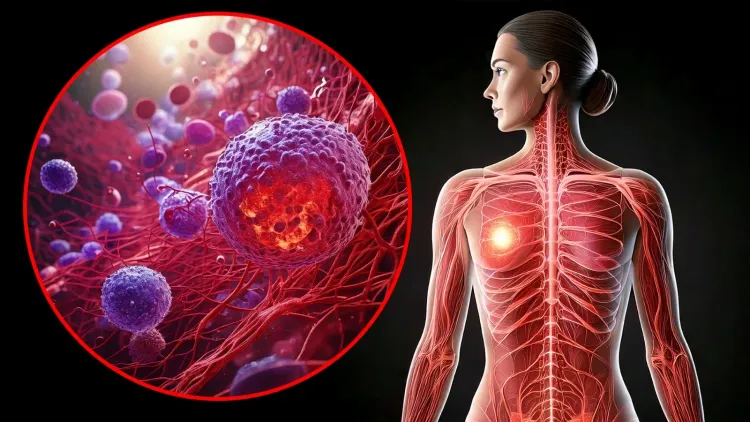Can Covid and Flu Viruses Reactivate Dormant Breast Cancer Cells?

Synopsis
Key Takeaways
- Respiratory infections can awaken dormant breast cancer cells.
- Covid-19 and influenza are significant triggers.
- Increased cancer death rates during the pandemic suggest a link to inflammation.
- IL-6 plays a key role in the activation of dormant cells.
- Cancer survivors should consult healthcare providers for precautions.
New Delhi, July 31 (NationPress) Recent research indicates that prevalent respiratory infections, such as Covid-19 and influenza, have the potential to activate dormant breast cancer cells that migrated to the lungs, potentially leading to the emergence of new metastatic tumors. This study, published in the journal Nature, is based on experiments with mice and a comprehensive analysis of human patients, reinforcing earlier findings that cancer survivors infected with SARS-CoV-2 faced an increased risk of mortality and metastatic lung disease.
Julio Aguirre-Ghiso from the Albert Einstein College of Medicine, US, noted, "Our findings suggest that those with a cancer history might need to take precautions against respiratory viruses, including getting vaccinated when possible and discussing concerns with healthcare professionals." Previous research has indicated that inflammatory responses can trigger the activation of disseminated cancer cells (DCCs) — cells that have detached from a primary tumor and spread to other organs, often remaining dormant for long periods.
The rise in cancer mortality rates during the Covid pandemic supports the hypothesis that significant inflammation might be reactivating dormant DCCs, according to Aguirre-Ghiso. The research team tested this theory on mice, exposing them to either SARS-CoV-2 or the influenza virus. Both viruses prompted the reawakening of dormant DCCs in the lungs, resulting in a rapid increase in metastatic cells within days of infection and the development of metastatic lesions within two weeks.
Molecular investigations revealed that the reactivation of dormant DCCs is primarily driven by interleukin-6 (IL-6), a protein released by immune cells in response to infections or injuries. This finding suggests that employing IL-6 inhibitors or other targeted immunotherapies could potentially prevent or mitigate the resurgence of metastasis.
To further explore the implications for humans, the research team examined two extensive databases and discovered that respiratory infections among cancer patients in remission are associated with cancer metastasis. Roel Vermeulen from Utrecht University, The Netherlands, stated, "The effect was most pronounced in the first year after the infection." The swift progression of cancer aligns with the rapid increase of dormant cancer cells observed in animal studies.
Vermeulen added, "Our findings imply that cancer survivors may face a heightened risk of metastatic relapse following common respiratory viral infections. It is crucial to note that our study was conducted prior to the availability of Covid-19 vaccines."










